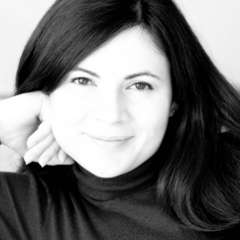Béla Bartók’s Bluebeard's Castle takes its inspiration from Charles Perrault’s fairytale; but while the original resembles more closely an actual horror story, with various potential moral interpretations (the atavic punishment of female curiosity and transgression, the discovery of truth and the loss of innocence, etc.), the opera navigates a more subtle and symbolic ground. It is this fundamental difference that director Enda Walsh seems to bypass in this production for Irish National Opera. Walsh’s direction and surtitles manipulate the source material, with additions and interpolations that twist the arm to the original text.
Musically, the show was pure joy. It’s seldom that you go to a performance where the singing flows in a such perfect way that you take it for granted. This was one of those times. One could not have possibly imagined two better interpreters than Joshua Bloom and Paula Murrihy for the roles of Bluebeard and Judith. Great credit should be given to them for memorising Hungarian, and to INO for choosing to stick to the original libretto instead of opting for an English translation.
Bloom was a tormented Bluebeard, with a wonderfully dark bass. Faithful to both text and score, he aroused pity rather than fear and indignation. Murrihy with her crystalline mezzo-soprano perfectly delivered the ambivalent Judith, morbidly attracted to the tenebrous side of her husband and willing to prove him bad at every cost. She persists in her quest for some evidence of evil and, in so doing, she loses him forever in her ultimate display of mistrust, represented by the opening of the forbidden door.
The RTÉ Concert Orchestra, under conductor André de Ridder, went even beyond their usual level of sparkle and cohesion, with notable moments at the opening of the fifth door, with a storm of percussion and brass, and later when Judith asks “Tell me whom you loved before me?”, with violins in full swing like in a romantic scene of a Golden Age Hollywood movie.
It was suggested (by conductor István Kertész) that Bartok’s real inspiration for this opera was his own life, with the fairy tale being only a narrative shell to it. An attentive reading of the libretto in conjunction with the music quite openly confirms this hypothesis. Critic Tim Ashley’s view also converges towards this reading, stating that what Judith “uncovers at the end of her self-destructive quest is not Bluebeard's expected monstrosity, but his profound aridity of soul”. The “torture” (the first door) seems more like a self-inflicted one than that of a sadistic monster. The blood seen everywhere is a symbol of internal suffering. In a significant anticlimax, Bluebeard's former wives are not found dead beyond the seventh door, but his relationship with them couldn't survive past the truth of his troubled life and so they have been ‘archived’ in his memory.
Central to the opera is the theme of true love. Does Judith really love Bluebeard? Is that why she wants to open all the doors, or is it rather her lack of trust, her believing all the rumours? “Judith, love me, ask no questions,” her husband keeps repeating. And indeed, as Abraham Lincoln said: “If you look for the bad in people expecting to find it, you surely will.”
There is no evidence in the libretto of Bluebeard being a murderer as is suggested by Walsh’s final scene, where tens of children are shown together with his former wives beyond the seventh door. This whole scene is spurious, almost farcical. Where does the idea of the zombie-like wives come from? Not from the libretto (“They wear crowns on their heads and their bodies are ablaze with priceless gems. Pale of face but with proud and haughty gait they step forward one after the other”). Judith exclaims “Living, breathing. They live here!”.
The fundamental key given in the libretto’s prologue is here omitted, with the removal of the verses: “The curtain of our eyelids is raised:/ Where is the stage: outside or within,/ Ladies and gentlemen?”. It’s a warning that the story unfolds on a psychological level, and shouldn’t be taken at face value.
While the set (Jamie Vartan) and lighting (Adam Silverman) create the appropriate gloomy atmosphere with touches of German expressionism, they deprive the audience of one of the few theatrical elements of the opera: the actual opening of the seven doors with a key. All the animation projected on stage (Jack Phelan) could not possibly replace the symbolic act of physically opening a door, and the dialectic game between symbol and meaning – so essential to artistic creation – gets levelled out.
Overall, a musically stunning performance on the back of too many liberties taken within the direction.




